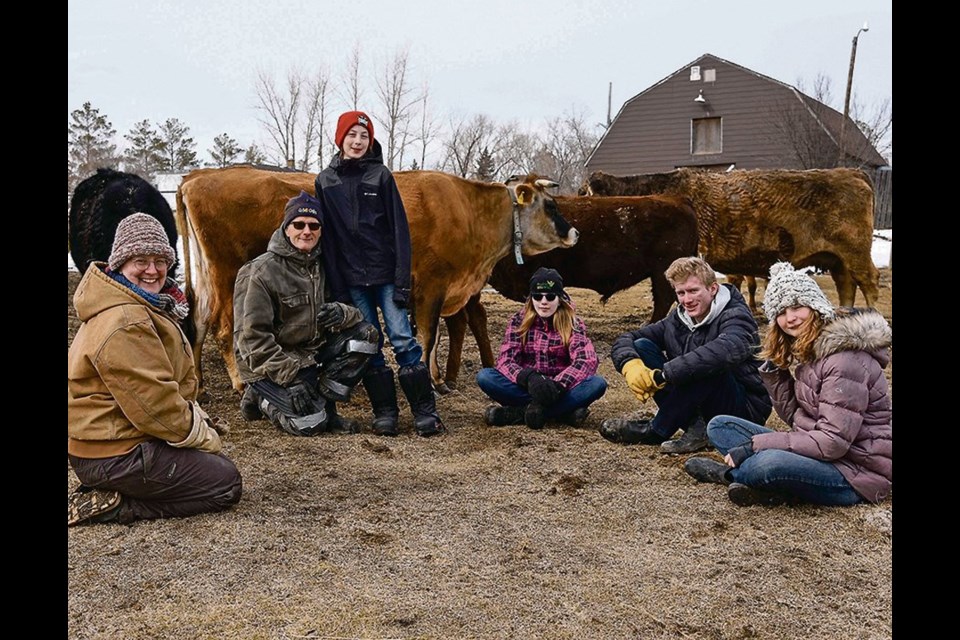LUMSDEN — “We do a little bit of everything,” said Jo White, as she described the 160-acre organic farm she owns with her husband, Jim.
“We’ve got 15 mixed cattle, 70 ewes and lambs, two dozen finishing pigs, 40 laying hens, four geese, six colonies of bees and a flower and vegetable garden.”
A milking cow completes their livestock inventory, with Jim doing that chore “come rain or shine” at five o’clock each morning.
He’s back in the house in time to mix fresh cream into his coffee and have breakfast with the family before starting his twice-daily school bus run.
Their operation, J & J White Farms, has a stand at the Regina Farmers Market and Regina Beach Farmers Market where they sell vegetables, meat, eggs and honey. They also sell products directly from the farm.
It will be two years this August that the couple, along with their four children, Harry, 17, Lucy, 15, Samantha, 14 and Joshua, 12, moved onto their farm northeast of Regina. They also have three grown children no longer at home.
Jo describes herself as a real farmer, but became so by marrying Jim, who was born and raised on a dairy tenant farm near Birmingham, England.
Jo grew up in the suburbs of West Midlands in England with a backyard garden about the size of a dining table.
“I would frequently go out into the fields with Jimmy when we were first dating. Completely new to this farming lark, I thought I could just don a pair of wellies and it would all come naturally to me,” she said.
Nicknamed “Big Butcher” by Jim, Jo is no longer a stranger to the jobs that a livestock operation entail. However, she said her real passions are growing heritage grain varieties, what she refers to as “greening.”
“We took the girl out the city and we took the city out of the girl, eventually,” Jim said with a laugh.
Added Jo: “I love seeds. I love buying them, saving them and stealing them. Well, by stealing, I really mean taking them mostly with permission, even if sought after the fact.”
It’s clear Jo and Jim have a hankering for the farming way of life despite challenges along the way. They’re on farm number three since moving to Canada 15 years ago.
They started out by buying a grain farm near Kelliher, Sask., but several years of flooding and poor crops forced them to sell and regroup.
“We didn’t lose everything but we lost a lot, enough to decide to make the decision to shut down and sell the equipment before we were stupid enough to try again,” said Jim.
Farm number two was 80 organic acres in the hilly, rocky and treed country of eastern Ontario, north of Kingston, where they stayed for two years and renovated a historic farm house.
A longing for the Prairies and the adult children who lived there brought them back to the West, with its open landscape and their latest organic venture.
“We actually missed the province. There’s something about the Prairies,” said Jo.
Added Jim: “The winters are nicer here than Ontario. It’s 20 degrees colder, but it’s doesn’t feel 20 degrees colder. We do like the landscape here. Yes, there’s a lack of trees in many places, but there are some nice bits, hence we’ve already planted close to 3,000 (trees) around the farm last spring.”
With plans for rotational grazing and a sunken greenhouse, their ambition is clear.
In fact, the title of a book Jo wrote and published last year is Ambitious Adventures in Organic Farming.
The paperback chronicles daily life on their small-scale farm and efforts to achieve a balance between heartache and humour.
They now have sights set on biodynamic agriculture, which Jo said is a form of alternative agriculture similar to organic farming.
It treats soil fertility, plant growth and livestock care as ecologically interrelated tasks, emphasizing spiritual and mystical perspectives.
“Biodynamic is a step further than organic. You’re not only avoiding the pesticides and the chemicals and all the artificial stuff, but you’re actually in cycle with phases of the moon. You pay attention to cosmic influences. We use a bunch of herbal applications to improve soil structure and our compost heap. There’s quite a bit to it.
“Sometimes it does sound a little bit hocus pocus when you’re talking about phases of the moon and burying manure in a cow horn for a whole year and then digging it up and diluting it down.
“But it’s microbiology and physics. It’s actually really simple,” said Jo.
Added Jim: “It’s not always easy, though, because simple and easy are not the same thing.”
While relatively new in North America, several European farmers have adapted biodynamic techniques.
“We’re going back to traditional methods and traditional varieties, I suppose, not modern stuff,” said Jim.
“I’ve also learned a lot more since being here and will until the day they put a wooden overcoat on me.”




